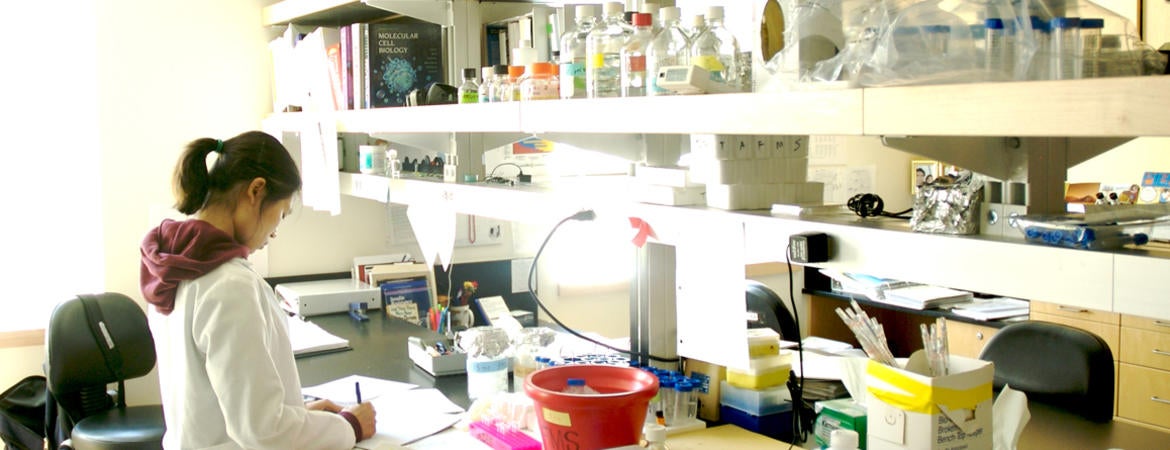About
Director's Message
From the clothes on our backs to the fuel in our cars and pollution reduction techniques, the applications of industrial biotechnology are embedded in our everyday lives, making it one of the world’s most integrated disciplines. It is the next evolutionary step toward a sustainable and environmentally-friendly chemical manufacturing industry, which itself creates the building blocks that comprise every human-made object. Yet the widespread impact remains unknown until researchers unlock its full potential.
Ushering in a new era of education in this important area, the Center for Industrial Biotechnology (CIB) pairs a master’s education with targeted experience at a research center focused exclusively on the topic. As part of the master’s degree, students receive a broad education in four industrial biotechnology areas - agriculture, industrial chemicals, biofuels, and healthcare - and then secure an internship to narrow their focus in the area of their choice.
Through the leadership of expert faculty from both the Marlan and Rosemary Bourns College of Engineering and the College of Natural and Agricultural Sciences, CIB is bringing about the next generation of industrial biotechnology experts and setting the agenda for research in one of the fastest growing disciplines in the country. In fact, market analysis shows that the industry has grown more than 10 percent each year for the past decade, with industrial biotechnology making upward of $370 billion in revenues last year.*
Through our research and master’s program, we look forward to graduating students from traditionally underrepresented backgrounds in this highly lucrative field. We hope you join us as CIB continues to identify and develop new applications that drive us into the future.
Ian Wheeldon
Director, Center for Industrial Biotechnology
Associate Professor, Chemical and Environmental Engineering
Why Industrial Biotechnology
Join the fastest growing industry with a profitable future
Imagine a world with global food security and enough resources to feed over 9 billion people. Imagine cleaner air and the reduction of the current use of 220 billion gallons of liquid transportation fuels. By 2050, solutions to the world’s greatest environmental issues will become a reality thanks to key advancements in industrial biotechnology fostered at UCR’s Center for Industrial Biotechnology.
- $370 billion contribution to the U.S. economy (2016)
- 10% growth rate each year for the past decade
- 2.5% of U.S. GDP attributed to industrial biotechnology
- 360,000+ life sciences jobs in California (2016)
- $108,752 average life science wage (2016)
- 12,031 life science contribution in California (2017 Biocom Economic Impact Report)
In addition to meeting global environmental needs, the industry has an impressive impact on the economy. Industrial biotechnology is one of the fastest growing industries.
Industrial Biotechnology industry needs engineers with a deep knowledge of biotechnology, but with a focus on design, construction, and operations support. Today, insights and development afforded by biotech provide exciting new opportunities for the agricultural, chemical, healthcare, pharmaceutical, and biotechnology fields.
By bringing together faculty from multiple disciplines of science to train students for positions in industry, academic, and government, CIB is addressing the research and training needs for these rapidly-evolving and intensive fields. The center will provide opportunities for training opportunities for training or re-training industry scientists and engineers in the fundamental of industrial biotechnology to increase productivity of food crops, high value and commodity products and address environmental
More information:
Mission and Vision
Mission
The Center for Industrial Biotechnology will provide a framework for convergent research and student training to translate recent advances in plant science, molecular biology and biological engineering into economically-viable products and processes for agriculture, healthcare, chemicals and energy production.
Vision
The Vision of the Center for Industrial Biotechnology is to become a national leader in training students for careers in industrial biotechnology, with a focus on engineering and technologies required for developing sustainable processes for production of fuels and industrial chemicals and for applications of biotechnology to agriculture and healthcare.
Goals |
Advance knowledge of fundamental scientific principles through collaboration |
|---|---|
| Train the next generation of U.S. engineers and scientists | |
| Enhance diversity of the science and technology workforce |
Latest News

